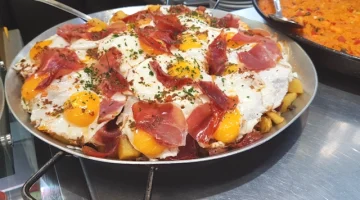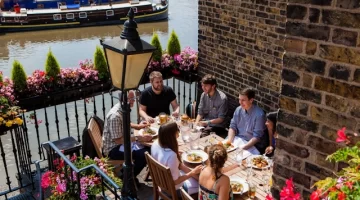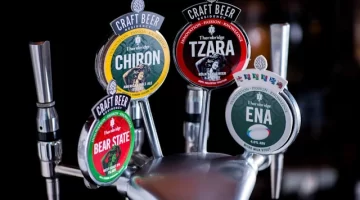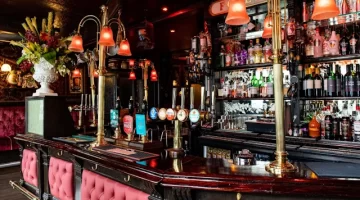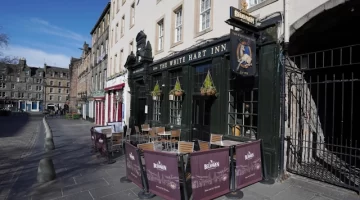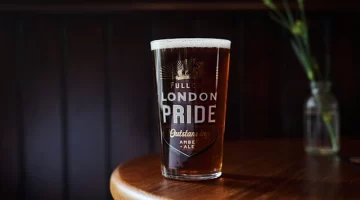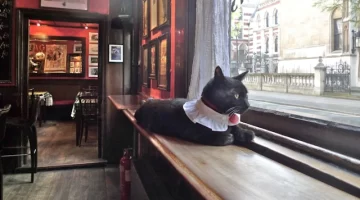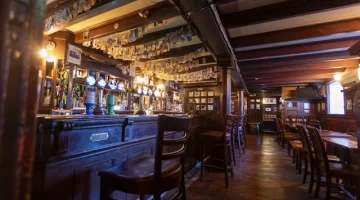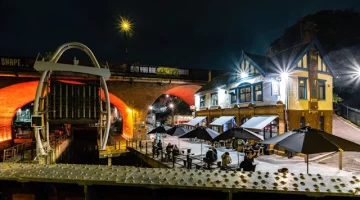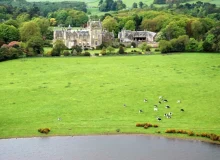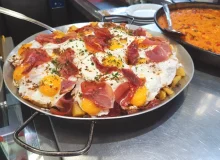To the Manoir Born
Mike Gerrard meets legendary Michelin-starred chef Raymond Blanc at his country house hotel and restaurant, Le Manoir aux Quat’ Saisons

There is a quote from Raymond Blanc on the menu at his restaurant/hotel, Le Manoir aux Quat’ Saisons, which says a lot about the man, his background and his approach to food and life. ‘The table,’ he writes, ‘remains a powerful symbol of friendship and celebration of life. In my family we could just about read the menu by listening to the conversation – a light start with drinks, the crossing of the bread by my atheist father, followed by the main course of massive discussions on religion, garnished with politics and, of course, the topic of sex for dessert… at which point my extremely devout Catholic mother would hurriedly leave the room.’
Blanc was born in 1949 in Besançon in south-east France, tucked between Burgundy and Switzerland. His father was a watchmaker and his mother, according to Blanc, a wonderful cook. ‘I learned everything from my mother,’ he says. ‘Cooking for her was an act of love, a mother’s love, the act of giving.’
At first the young Raymond leaned towards the meticulousness of his father, and trained to become a draughtsman, but when he moved to England in 1972 to learn English, his love of food won out. To support his studies he got a job in a restaurant kitchen, and later as a chef. ‘I entered a kitchen disguised as a chef,’ he says. ‘I was self-taught. I never had a master. I tried reading books but they assumed you already knew what you were doing. But the joy of food is about… a sensuality. That’s where it starts, to look for the very best. All the things my mother and grandmother put into their cooking.’
It wasn’t long before Blanc had his own tiny restaurant in Oxford, Les Quat’ Saisons (the Four Seasons), tucked ‘between a ladies underwear shop and Oxfam. It was not a smart location. A small kitchen, very small, 12 red and white check tablecloths, very humble.’
Humble it may have been, but within 12 months he had his first Michelin star and was obviously going places. However, it’s a long journey from a 12-seater restaurant to running a hotel/restaurant with a staff of 230 people, and I ask RB (as his staff call him) why he bought Le Manoir.
‘I started to dream about a bigger place,’ he says. ‘I had decided to look for my “home sweet home”, somewhere I loved where I could have a small herb garden, maybe 3-4 bedrooms for friends to stay. But life is not like that. You may say that your ideal woman is tall and dark and intelligent and this and that… and then you fall in love with a small blonde. I fell in love with this house. I realised that commercially a small house didn’t make sense. We needed more bedrooms. Lots of renovations were needed. It had dry rot, wet rot, you name it. The garden was like a zoo for creatures I’d never seen before. It took about £2 million for the refit, and this was in 1984. Then more things need doing and you need more bedrooms to pay for that.’
Running the Manoir (‘I am a control freak,’ he admits) leaves Blanc little time for travelling, but he was enchanted by Japan. The Manoir incorporates a Japanese garden, and Blanc says he loves Japanese art and culture. ‘I like even the smell of Japan,’ he says, another reference to the sensuality at the heart of his life. ‘Wherever you travel, there is a different smell. I love this, and in Japan it is the smell of rain on the blossom.’ He loved Japan so much that he decided to hold a Japanese Festival at the Manoir. ‘We had Japanese sculptures in the garden, it was magnificent. Of course everyone thought I was mad, the cost of it all, but now we have lots of Japanese guests. It was a good business decision too. I am not a businessman. For me the ideal must come first, and then I make it fit the business. A businessman has the business first.’
Blanc still travels to France, but loves England and after over forty years here he has trained countless Michelin-starred chefs.
Learn how to cook Asparagus, Poached Eggs and Lemon Sabayon with Raymond Blanc
‘I prefer the romantic values of the British rather than the sentimental values of the French,’ he declares. And where many people say that the British are insular, Blanc says it is in fact the French. ‘I was once a wine consultant for Marks and Spencer. It was when New World wines took over the wine world. Except in France. There they continued to believe that their wine was superior. No-one could tell them anything different. They would not listen. Only now, twenty years later, are they starting to discover the joys of the new world wines, and of course it now becomes fashionable and is a bit of a craze there. But what happened with wine might happen with food too, in time.’
Meanwhile, the Manoir continues to describe its cooking as Modern French, and such is the standard that it has kept its two Michelin stars since first achieving them in 1983. Blanc himself has been European Chef of the Year, the Most Respected Chef in Britain, Catey Chef of the Year and received an Honorary Doctorate of Business Administration from Brookes University in Oxford. Does he still have ambitions, or has he achieved them all?
‘The Manoir is still a young place,’ he replies. ‘The old lady is light-footed. I have projects for the future, ideas for the restaurant. But I have been working 16-17 hours a day for the last few years. At the moment I am just breathing.’





